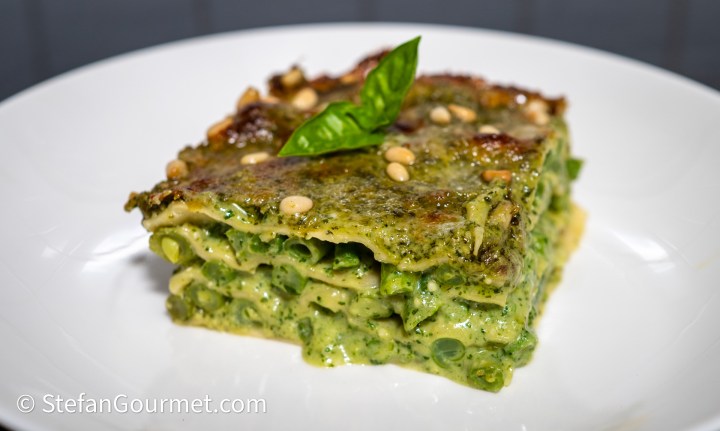
Pesto alla genovese is one of those ingredients that is much better when made at home, even if you use a blender instead of a mortar and pestle. There are two reasons for this. First, almost all store-bought pesto contains incorrect ingredients: pine nuts are replaced with cashews, extra virgin olive oil with sunflower or canola oil, Parmigiano Reggiano with other cheeses, and sometimes even some of the basil is substituted with spinach or parsley. Second, the flavor of homemade pesto is fresher, brighter, and more complex. And if you have a blender, it’s not a lot of work. The most time-consuming part is stripping the basil leaves from the stems.
Making homemade lasagna is a lot of work, especially if you prepare fresh pasta dough, but it’s absolutely worth it. Most people are familiar with lasagne alla bolognese, but one of my favorites is lasagne alla genovese. Both dishes feature the most iconic recipe from their respective hometowns: ragù alla bolognese from Bologna, and pesto alla genovese from Genoa. In the Genovese version, the pesto is mixed with béchamel, and the lasagna is layered with grilled zucchini or green beans, sometimes with the addition of boiled potatoes.
Ingredients
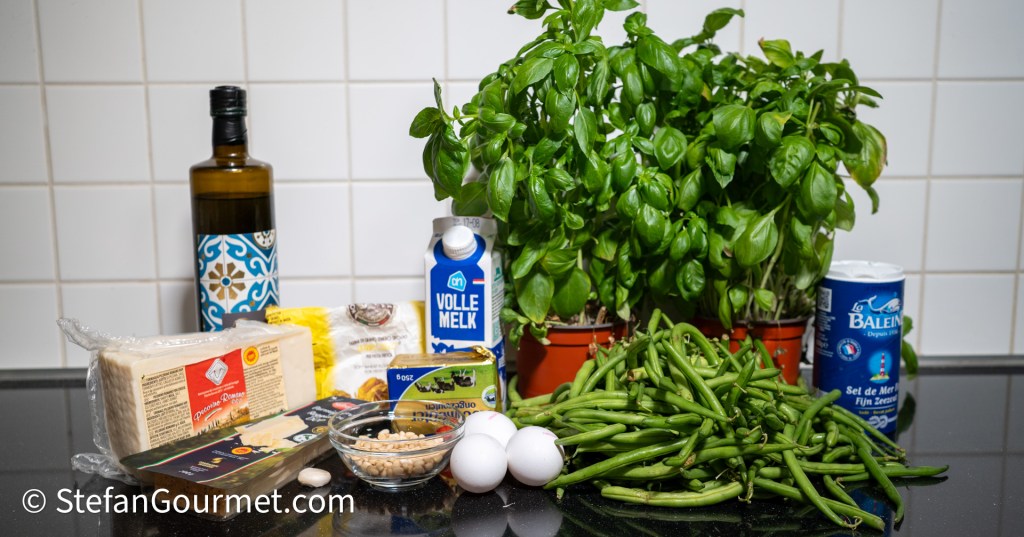
For a 20 x 30 cm (8 x 12 inch) lasagne, 6 to 8 servings
- fresh pasta dough from 3 eggs and 300 grams (2 cups) Italian 00 flour
- 900 grams (2 lbs) green beans, trimmed
- white sauce from 500 ml (2 cups) full milk, 50 grams (3 1/2 Tbsp) butter, 50 grams (5 Tbsp) flour, salt, freshly ground white pepper, and a dash of nutmeg
- homemade pesto from 75 grams basil, 30 grams pine nuts, 75 grams freshly grated parmigiano reggiano (or a mixture of parmigiano and pecorino), 75 grams extra virgin olive oil, 1 garlic clove, 1/8 tsp salt
- more butter and freshly grated parmigiano
- more pine nuts for sprinkling on top
Instructions
Make fresh pasta dough from 3 eggs and 300 grams (2 cups) Italian 00 flour using my instructions, and allow the dough to rest in the refrigerator for at least half an hour.

Make the pesto using a pestle and mortar or food processor. If using a blender, start with 75 grams basil, 30 grams pine nuts, 75 grams extra virgin olive oil, 1 garlic clove, and 1/8 tsp salt, and blend until quite smooth. Then add 75 grams freshly grated parmigiano reggiano (or a mixture of parmigiano and pecorino), and blend to incorporate. For pestle and mortar, check out this post.
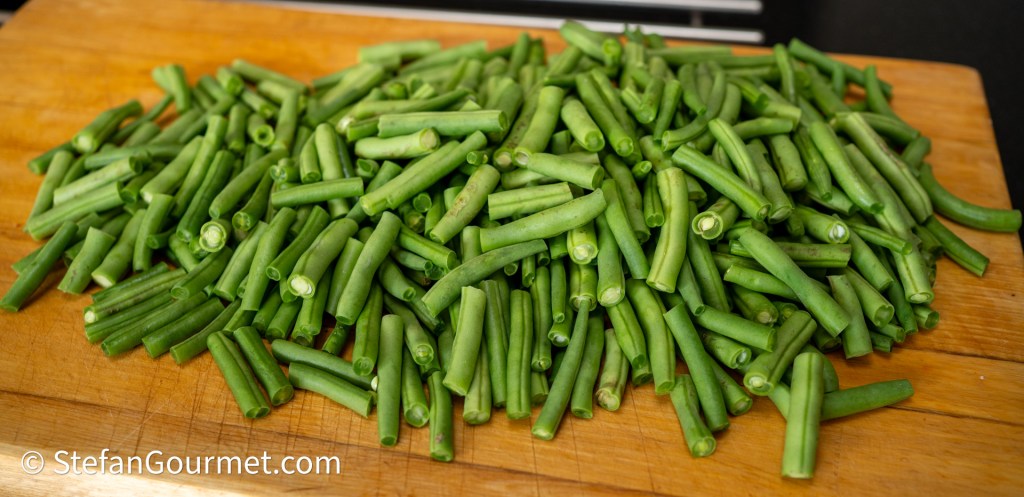
Snap or cut the ends off the green beans, then cut them into pieces of about 5 centimeters (2 inches).
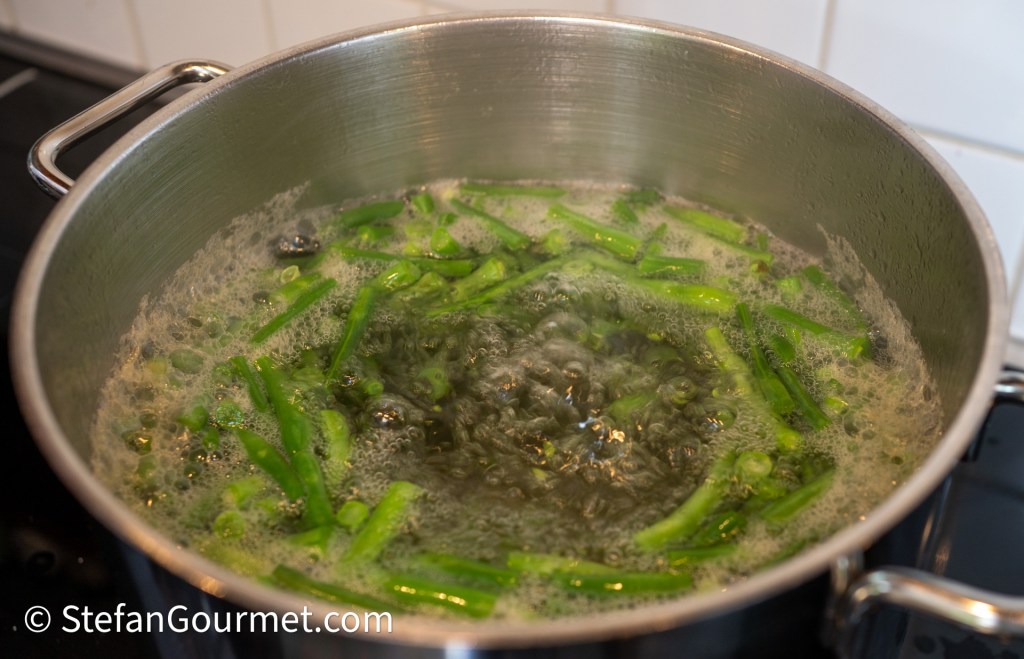
Bring a saucepan of water to a boil. Add salt and a pinch of baking soda, then add the green beans and boil them for about 5 minutes, depending on their thickness. They should still be firm to the bite. The baking soda enhances the green color of the beans and helps them become tender more quickly.
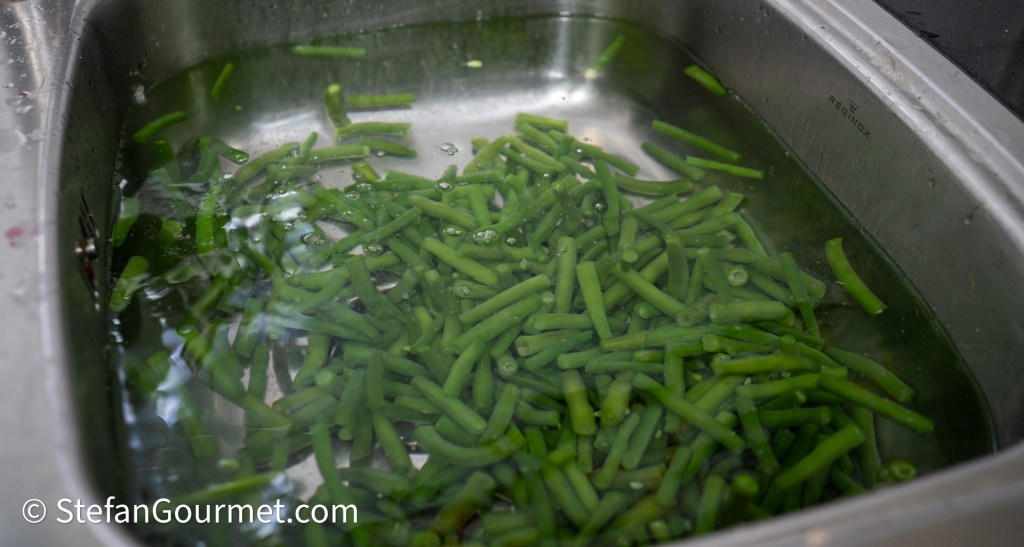
Drain the green beans in a colander, then plunge them into cold water, preferably with ice cubes, to stop the cooking. This process of briefly boiling and then chilling the beans is called blanching.
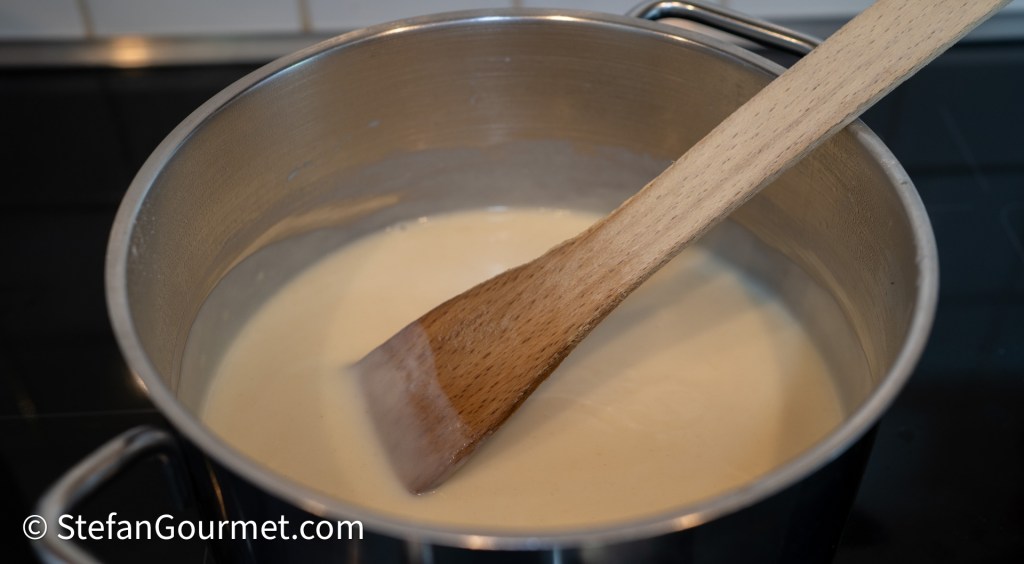
Make a white sauce using 500 ml (2 cups) full milk, 50 grams (3 1/2 Tbsp) butter, 50 grams (5 Tbsp) flour, salt, freshly ground white pepper, and a dash of nutmeg, using my recipe.
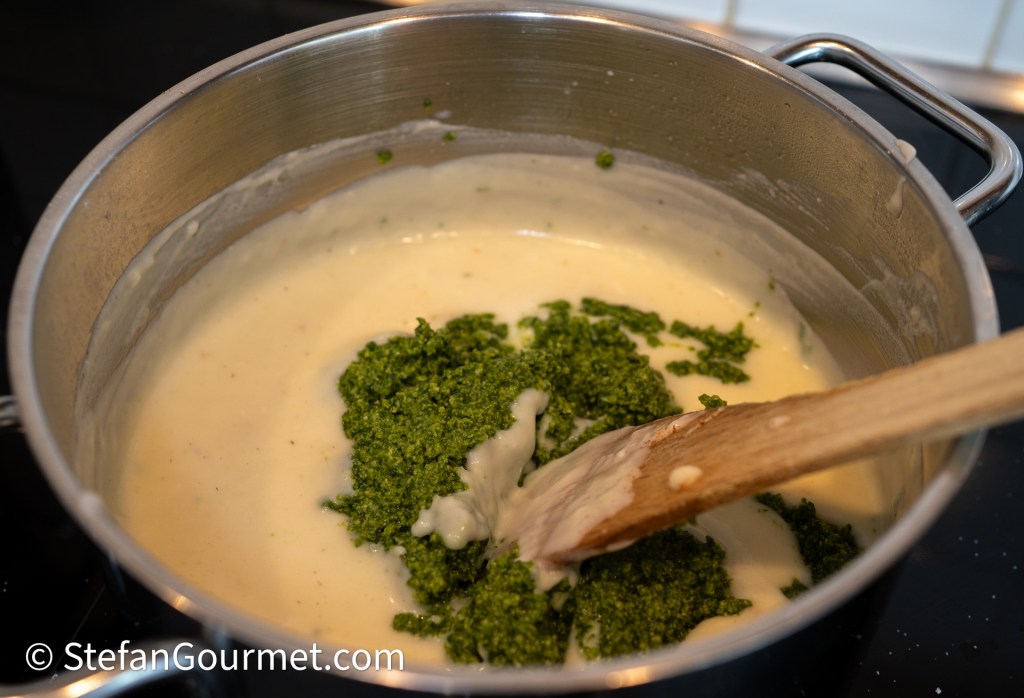
When the white sauce is done, add the pesto…
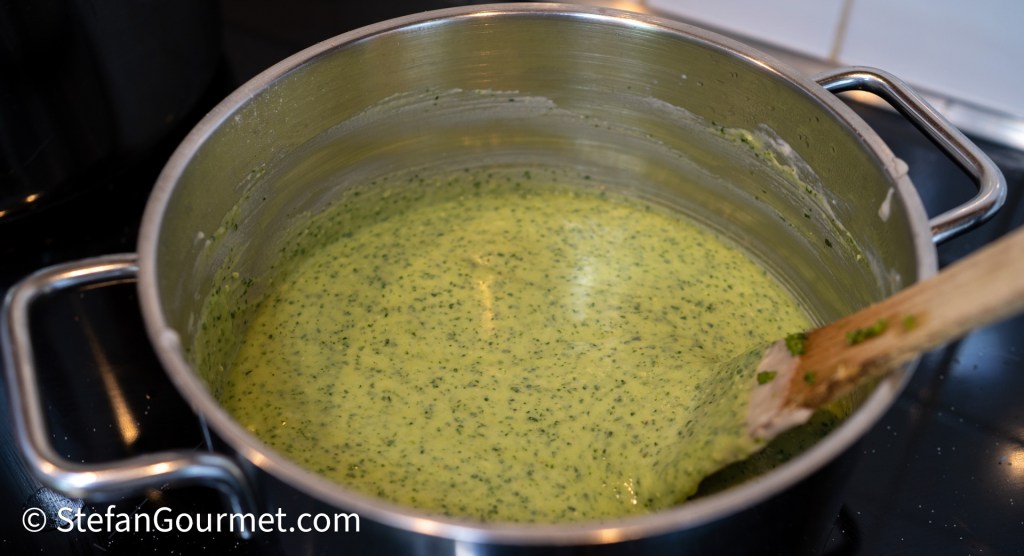
…and stir until mixed.
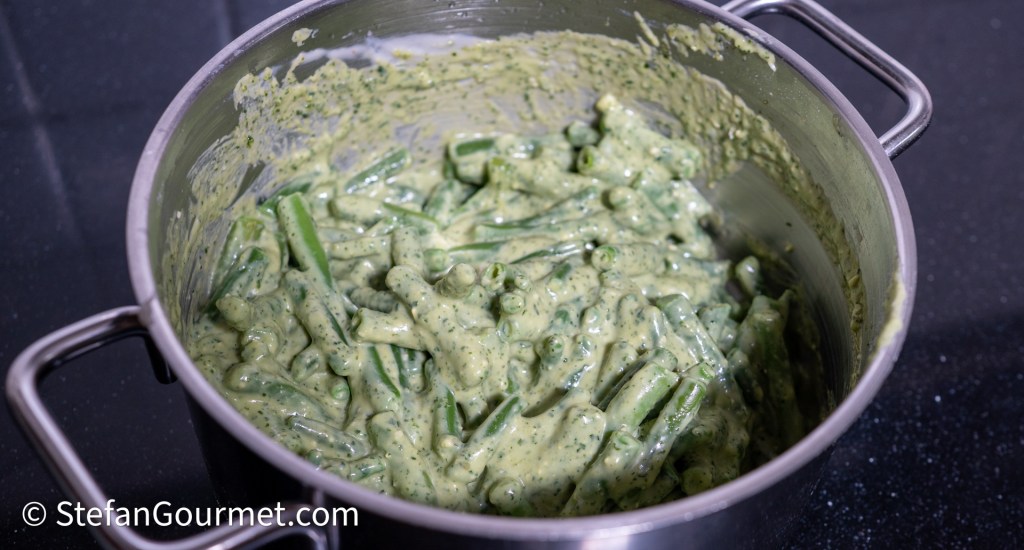
Mix the green beans with 3/4 of the pesto mixture, and reserve the remaining 1/4.
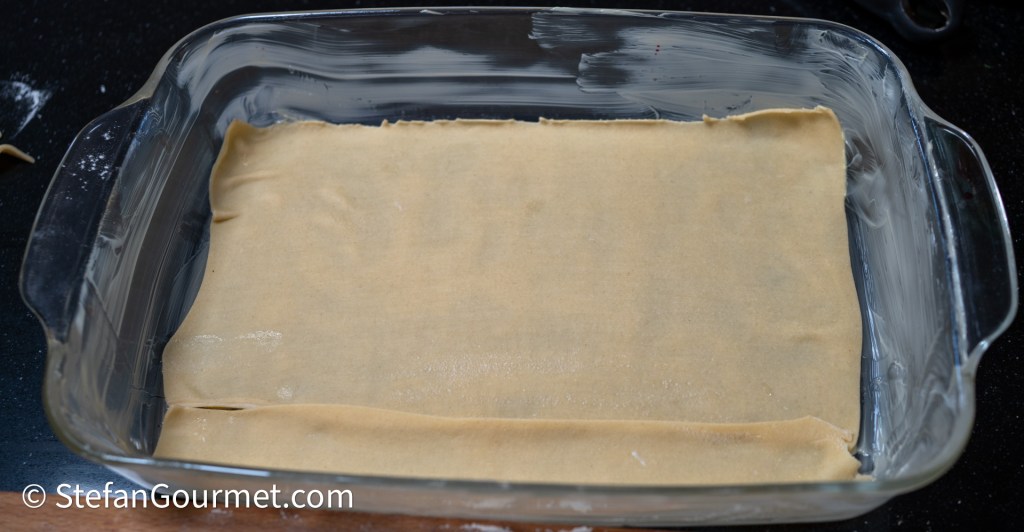
Preheat the oven to 200C/400F.
Grease a 20 x 30 centimeter (8 x 12 inch) oven dish with butter. Roll out the pasta dough thinly and line the bottom of the dish with pasta, using a patchwork of several sheets if needed. It’s easy to trim the sheets to the right size by placing a cutting board next to the dish.

Spread 1/3 of the green bean and pesto mixture over the pasta in an even layer…
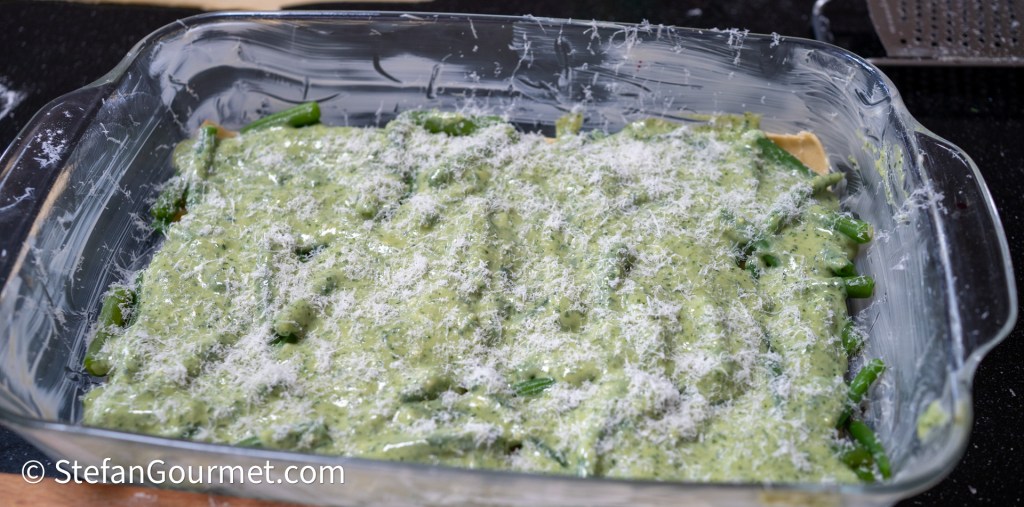
…then sprinkle generously with freshly grated parmigiano reggiano.
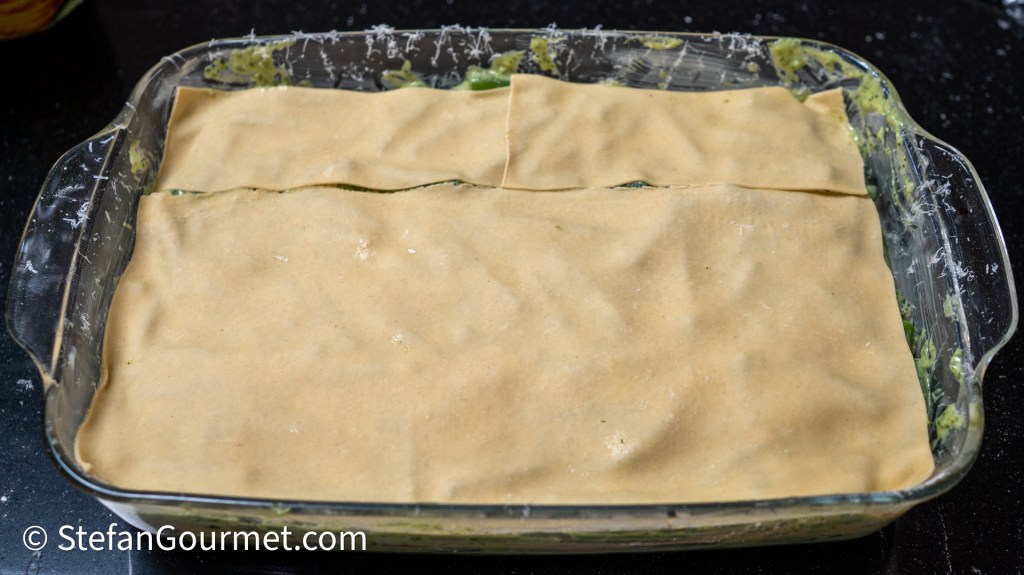
Repeat the layers in the following order: pasta, green beans with Parmigiano, pasta, green beans with Parmigiano, and finally a top layer of pasta.

Spread out the reserved pesto mixture on top.

Cover the top layer with freshly grated Parmigiano Reggiano, dot with bits of butter, and scatter pine nuts over the surface.
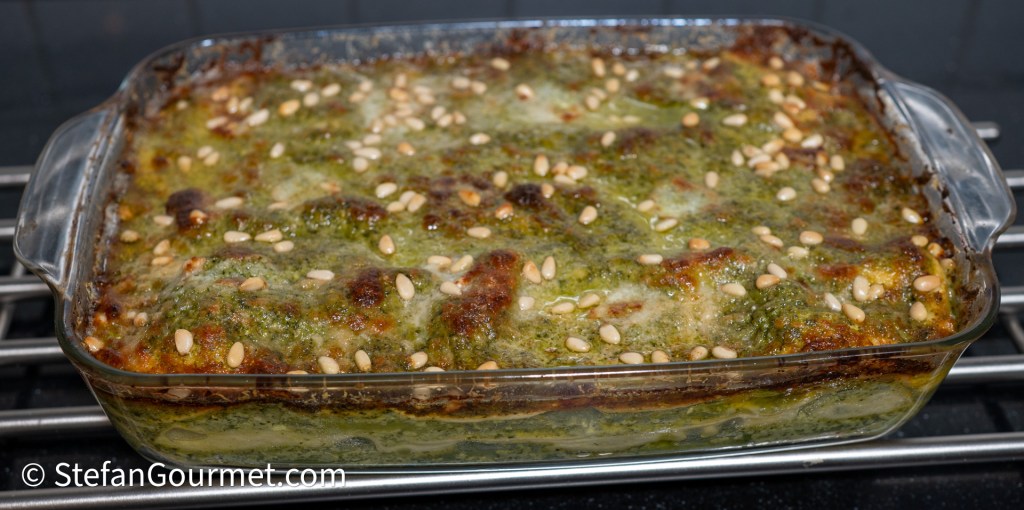
Bake the lasagna in the oven at 200°C (400°F), not fan-forced, until it bubbles and the top develops brown (but not burnt) patches, about 30 minutes. Let the lasagna cool for about 5 minutes before cutting; this helps keep the pieces intact when transferring them to plates.
Wine pairing
Pairing wine with pesto can be tricky, as the acidity of the wine may be accentuated by the pesto. Look for a creamy white wine with a full body and low to medium acidity, but without new oak, such as a Marsanne or Grenache Blanc from the South of France. The classic pairing would be a Vermentino from Liguria (i.e. from the area around Genua), but I’ve had mixed results with that.


Beautiful! I’ve never seen a lasagne with green beans!
LikeLiked by 1 person
As for mortars and pestles: As much as I like the idea, I’ve had mixed experiences with them. The basil oxidizes very quickly and turns brownish. This is probably because I’m too slow. But I’ve found that a small kitchen blender is a very good choice in most cases. I use a blender very similar to yours, which rotates relatively slowly. It doesn’t heat up the basil or, more importantly, the olive oil. It works great for me.
LikeLike
I’m from Genova: put the blames in the freezer for half an hour
LikeLiked by 1 person
Wow! An amazing idea! Thanks for sharing your delicious recipe. I’ll absolutely have to try that one.
LikeLiked by 1 person
This is a lovely presentation. I’m sure it’s delicious!
LikeLiked by 1 person
Arriving very late as the result of computer problems > this beautifully presented version is quite new to me 🙂 ! Have never seen beans in the dish to begin with! Do absolutely agree about the homemade v store-bought pesto as a start >>> must tell others
LikeLiked by 1 person
What a beautiful lasagna! Making your own pasta is so worth it. I make a 10+layer lasagna with basil and spinach so I know how much work this is, but well worth it. I usually make enough for a few meals because it’s not that much more effort.
LikeLiked by 1 person
Grazie per questa ricetta della mia terra!
LikeLiked by 4 people
That looks so yummy!!
LikeLiked by 1 person
Yummy in my tummy!
LikeLiked by 4 people
Yummy 😋
LikeLiked by 1 person
This looks so divine!!! In Japan we do not commonly have ovens. I want to make this so bad T_T I hope I can figure it out!! I also have never made my own pasta before!
LikeLiked by 2 people
This looks so good!
LikeLiked by 1 person
That looks delicious!
LikeLiked by 1 person
Looks delicious ! I will share it with my wife. Hopefully she will make it as delicious as it looks ! Thank you for sharing.
LikeLiked by 1 person
That looks so yummy ; thank you for sharing !
LikeLiked by 1 person
Would rabbit be a nice addition to Lasagna Pesto Basil?
LikeLiked by 1 person
In terms of flavor, rabbit or chicken would work. Make sure to put salt on the rabbit at least an hour before cooking, to enhance the flavor of the rabbit so it doesn’t get overpowered too much by the pesto.
It would need to be small pieces, preferably sized and shaped similar to the green beans to integrate with the rest.
Having said that, Italians would not do that. Italians would serve the rabbit before (as an antipasto) or after the lasagna (as a secondo), not at the same time as part of the lasagna.
LikeLike
This looks absolutely incredible! The step-by-step photos are so helpful and that vibrant green color is stunning. I love how you’ve explained the traditional Genovese approach and shared the wine pairing suggestions. Thank you for preserving and sharing this wonderful Italian tradition!
LikeLiked by 8 people
omg this looks delicious
LikeLiked by 1 person
Looks great; this would probably work well with kale pesto as well.
LikeLiked by 1 person
You may want to combine kale pesto with something sweeter than green beans, the first thing that comes to mind is peas.
LikeLike